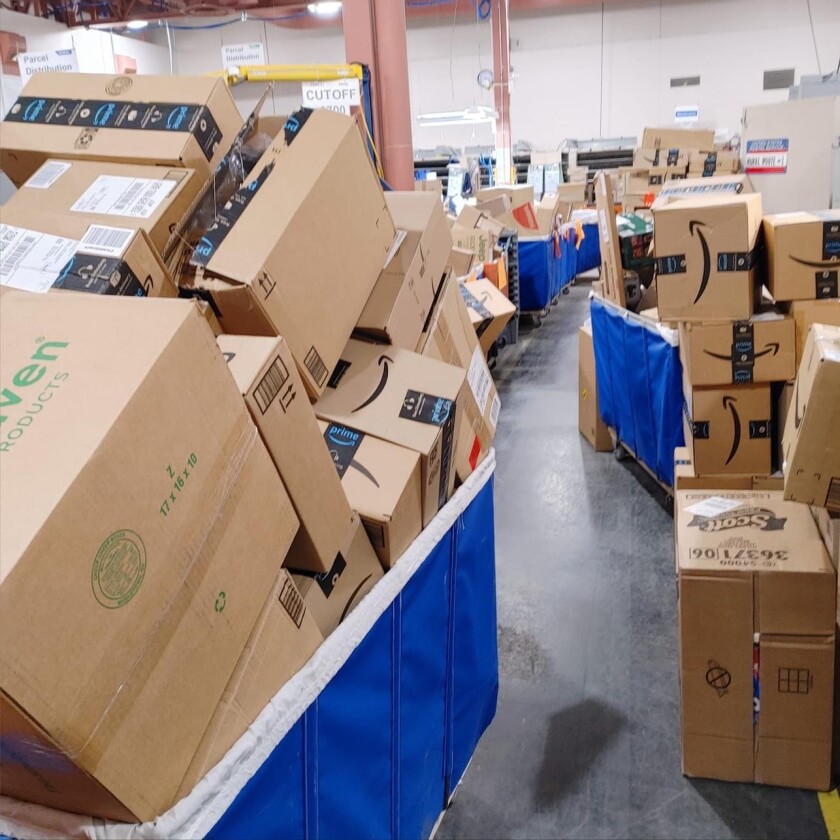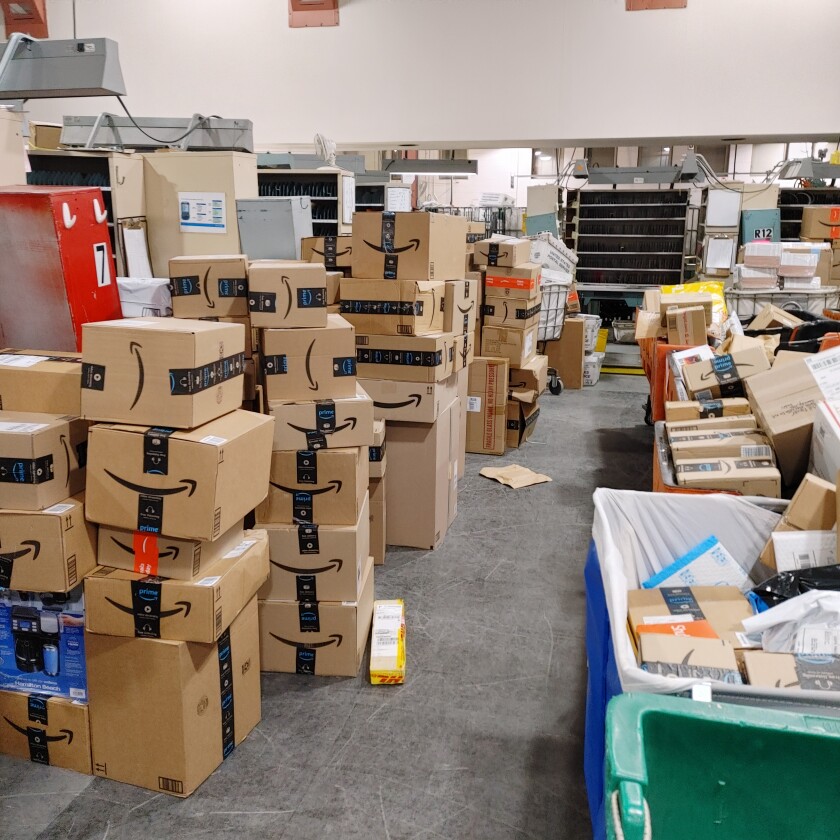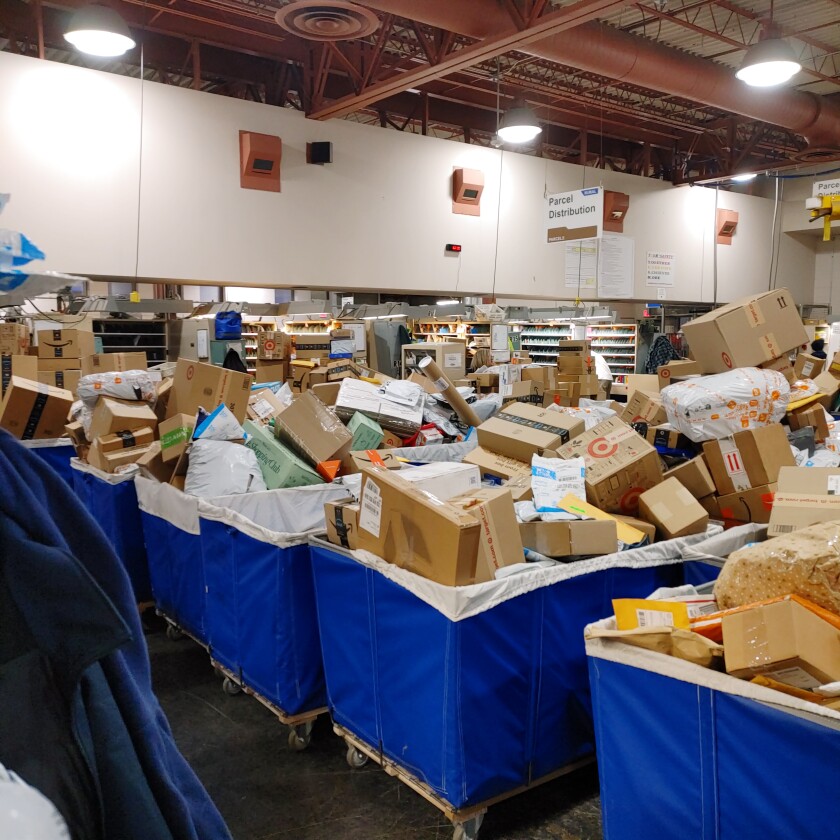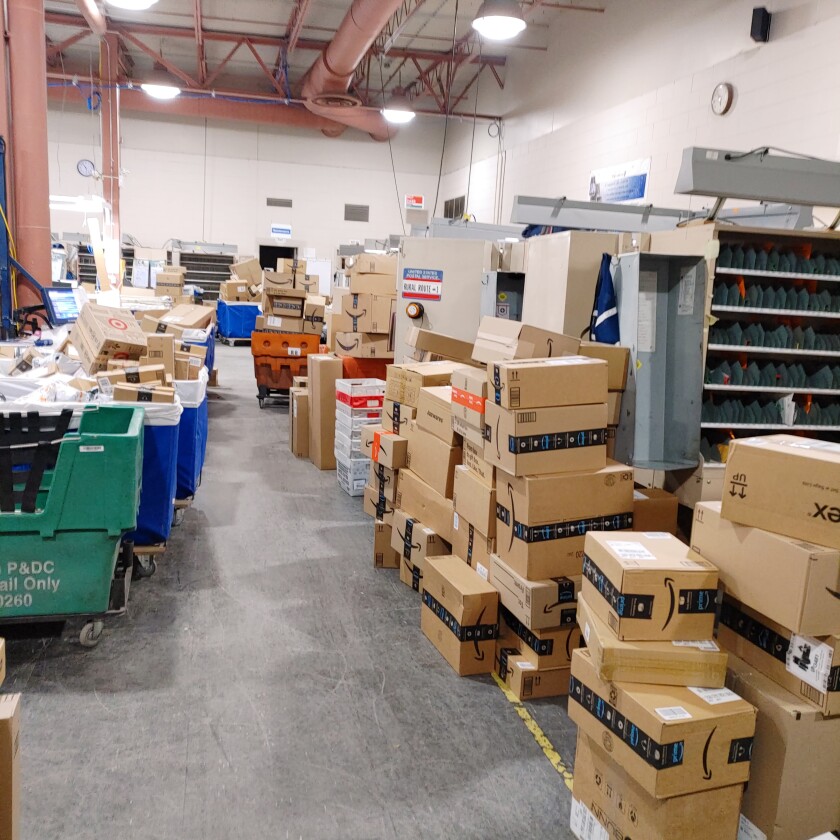BEMIDJI — Dennis Nelson had wanted to see the fight for better working conditions at the Bemidji Post Office to the end, but after weeks of arduous 12-hour shifts and an increasingly toxic and hostile work environment, even he’s hit a breaking point.
Nelson, who helped organize the initial picket by rural carriers in November that led to officially turned in his resignation on Thursday after 20 years.
ADVERTISEMENT
“I hate leaving it, I hate not being a part of it anymore. I started this fight, and I hate not seeing it to the end,” he said.
But he hit the point of no return, just like seven of his coworkers before him. For Nelson, it came after he had been delivering packages all morning, namely from Amazon, and had returned to the post office to finally do a run of regular mail.
“Then management brought out a huge hamper of parcels that were hidden on the far side of the building, and said ‘Don’t forget about these!’” he recalled.
Working conditions
The trouble at the Bemidji Post Office started in November, when the office began delivering packages for Amazon as a part of an agreement between the company and the United States Postal Service first signed in 2013.
Rural carriers shared that their average working days went from eight hours to 12, and they were informed that their days off were canceled and scheduled sick leave would no longer be honored.
In addition to long working hours, rural carriers have also not been paid for their additional time due to the system of route evaluations. If a rural carrier’s route is evaluated as eight hours, they are paid for eight regardless of whether it takes them seven or nine hours to complete the job.
Several postal employees have also reported that they were told to prioritize Amazon packages over other deliveries, something the USPS has denied it does. These circumstances have led to considerable delays in mail delivery throughout the community, with businesses waiting for payments and residents waiting for important documents and even medication.
ADVERTISEMENT
For its part, Amazon has apologized for any delays experienced in the Bemidji area and says that it works closely with the USPS to refine volume forecasts so it can operate smoothly. It also denied that the USPS is prioritizing Amazon packages.
Statements from the USPS and Amazon haven’t made much difference to Nelson or the others who have been working at the post office, however, with Nelson calling the claims denying there’s a problem or that Amazon isn’t being prioritized “lying through their teeth.”
After he resigned, Nelson posted images on Facebook of just how bad things have gotten at the Bemidji office, with the pictures showing stacks of Amazon boxes piled next to each other and some areas with hardly enough space to walk through.
“It’s an utter fire hazard in there, we don’t have the logistics to support any of this,” shared Dan Rickert, a rural carrier who recently took early retirement because of the working conditions. “I didn’t want to leave. I weathered everything up until the contract with Amazon, that was the straw that broke my back.”

For those who remain at the post office, Nelson said they're the ones who don’t have a choice and who rely on the job.
“The people who are still there are the people who cannot leave, because of family situations, mortgages,” he said. “Every single one would leave if they could.”
The situation has gotten bad enough that representatives from district management have arrived in Bemidji, with Nelson saying they’ve doubled down on their expectations that every package go out regardless of how long it takes.
ADVERTISEMENT
Before all of this began, Nelson shared that the number of deliveries had been managed by a program that estimated the office’s delivery capacity based on the number of employees available.
“The (Bemidji) postmaster was using that program, and saying once we reach that number we weren’t going to sort any more packages because that’s all we could handle,” he explained. “Well, apparently that wasn’t good enough and Amazon was complaining we were delaying their packages, so when (district management) showed up they forced every package out.”
This expectation has meant carriers have been working well into the evening. With eight carriers having quit the Bemidji Post Office, nearly half its total number of rural carriers, the office has become increasingly short staffed and has had to pull in assistance from other offices in the region to cover its 16 routes.
Another problem Nelson reported, and one that might explain some of the discrepancies in understanding between the local and district offices, is how packages are recorded.

Postal employees use a scanner that registers each delivery into a category of mail: postcards, letters, flats and parcels. The relevant differences between a flat and a parcel are their dimensions, with parcels being larger and flats smaller and no more than ¾ of an inch thick.
According to Nelson, when scanning lightweight deliveries that should be classified as parcels based on their size, they’re frequently mistakenly categorized as flats. He explained that this means the number of actual parcels Bemidji’s carriers are delivering is underreported to district management.
Need for action
Conditions at the Bemidji Post Office haven’t gone unnoticed, with U.S. Senators Tina Smith and Amy Klobuchar to the Postmaster General by Nov. 28.
ADVERTISEMENT
In response to the senators' letters, the Postal Service asserted that: "For the most part, all mailpieces and packages, including in Bemidji, are being delivered daily."
But after reports contradicting these claims continued to pour into the senators' offices, Klobuchar and Smith organized a listening session on Tuesday in Bemidji to learn more about the situation. After hearing from residents, postal workers and their families, the senators emphasized that they stand by Minnesotans' testimonies over statements made by the USPS.
“The Postal Service management has asked me to take their word over the words of Minnesotans. I believe Minnesotans,” Smith said. “I have heard from postal workers and their families in Minnesota, and their testimonies are heart-wrenching. I stand with these workers and every Minnesotan who relies on the Postal Service to meet its own standards for delivery.”
A release also shared that while a system-wide policy of prioritization may not exist, representatives of the USPS had explained to congressional offices during a briefing that individual post office managers have the discretion to prioritize packages over mail, lending credence to reports from the Bemidji Post Office.

For his part, Nelson hopes that the senators will follow through on their commitment to postal workers and the Bemidji community.
“We need Klobuchar and Smith to follow through and make sure these changes actually happen,” he said. “If it’s just lip service, it’s nothing.”
What he’d like to see is an independent audit of post office practices, a concerted effort to hire more employees — which he believes will require improvement in pay, benefits and working conditions — and returning the delivery of large packages to UPS and other shipping companies.
ADVERTISEMENT
“There are some things we can’t deliver, the postal service was never designed for parcel delivery to this scale,” Nelson said.
The culture also has to change, to decrease its toxicity and hostility toward employees, according to both Nelson and Rickert.
“It’s a toxic environment right now. It’s very difficult to walk into work when you don’t see anyone smiling, we’re walking around like zombies,” Rickert explained.
For them, this change needs to start at the top with Postmaster General Louis DeJoy.
“The postmaster general sets the tone. The ways he treats his subordinates are the ways they treat their subordinates,” Nelson said. “The atmosphere changed for the worse when he took the reins. He might be able to financially save the postal service, but at what human cost?”
While Nelson plans to continue paying attention to everything happening at the Post Office, for now, he can’t help but regret how things have played out.
“You spend 20 years doing something, you’re obviously going to miss it,” Nelson said. “It’s not an easy job, but it’s a job I liked doing. And I was good at it.”
ADVERTISEMENT












